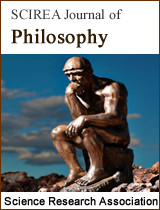Meta - Dialectical Method In Explaining Everything - The Basic Questions of Existence of Everything
DOI: 10.54647/philosophy720098 3877 Downloads 154277 Views
Author(s)
Abstract
In the study of the general methodology of science and philosophy, we have discovered a common fundamental problem of the “paradox of the basic element” that creates inconsistencies in social and natural theory and general ontology and epistemology. Our study of the state interactions as a major international actor leads us to the conclusion that the unsolved “paradox of the basic element” of the General systems theory (GST) applied in the neorealist doctrine of international relations generates apparent fundamental theoretical weaknesses that had to be resolved. Therefore, herein we propose a solution to the paradox of the basic element on an ontological level by showing that not the element, but rather the relation is the basic “entity” of the system. Such an approach, where the relationship is the most fundamental category and plays a primary role in the system, transforms the GST into a relationist theory (systemic relationism) that includes the relevant systemic variables both in the system as a whole and in its subsystems (or elements). At the same time, due to the equivalence of the “paradox of the basic element” with the paradox of existence of anything or everything (usually formulated as “Why everything (that is) exists” (and not just nothing)), our relationist approach proved to be a good methodological tool for resolving this fundamental question of the general ontology.
Keywords
interaction, system, element, state, existence, everything, nothingness, relation
Cite this paper
Igor Janev,
Meta - Dialectical Method In Explaining Everything - The Basic Questions of Existence of Everything
, SCIREA Journal of Philosophy.
Volume 4, Issue 3, June 2024 | PP. 50-61.
10.54647/philosophy720098
References
| [ 1 ] | Von Bertalanfly, L. (1971) General Systems Theory. London: Penguin Press. |
| [ 2 ] | Durkheim, E. (1982) Rules of Sociological Method. Free Press; 2nd printing ed. |
| [ 3 ] | Engels, F. (1968) Dialectic of Nature. International Publishers. |
| [ 4 ] | Erman, J. (1979) Was Leibniz a relationist?, in: “Studies of Metaphysics”, Midwest Studies in PH Vol. IV, p. 277. Univ. of Minnesota Press, (Minnesota Archive Edu.) |
| [ 5 ] | Hegel, G.F.W. (1977) Phenomenology of Spirit. Oxford: Clarendon Press. |
| [ 6 ] | Heidegger, M. (2000). Introduction to Metaphysics. Yale Univ. Press. |
| [ 7 ] | Merton, R. K. (1996) On Social Structure and Science. Chicago: The University of Chicago Press. |
| [ 8 ] | Newton, I. (1688, 2013) The Principa: Mathematical Principles of Natural Philosophy. Cambridge: Trinity Colledge (originally published 1688.) |
| [ 9 ] | Ray, C. (2008) Time, Space and Philosophy. Elsevier. |
| [ 10 ] | McTaggart, J. (2005) Studies in Hegelian Dialectic, Cambridge Univ. Press. |

